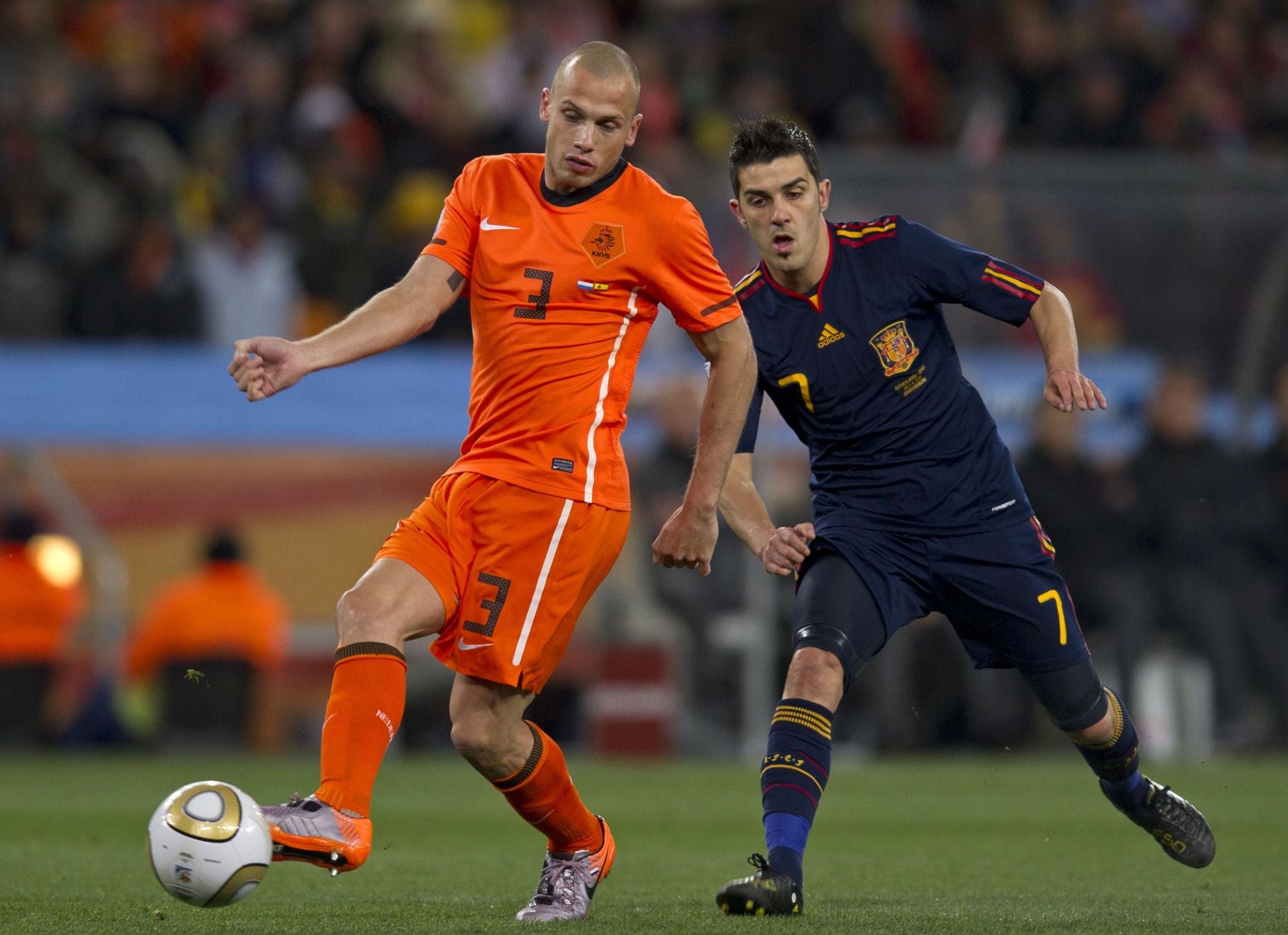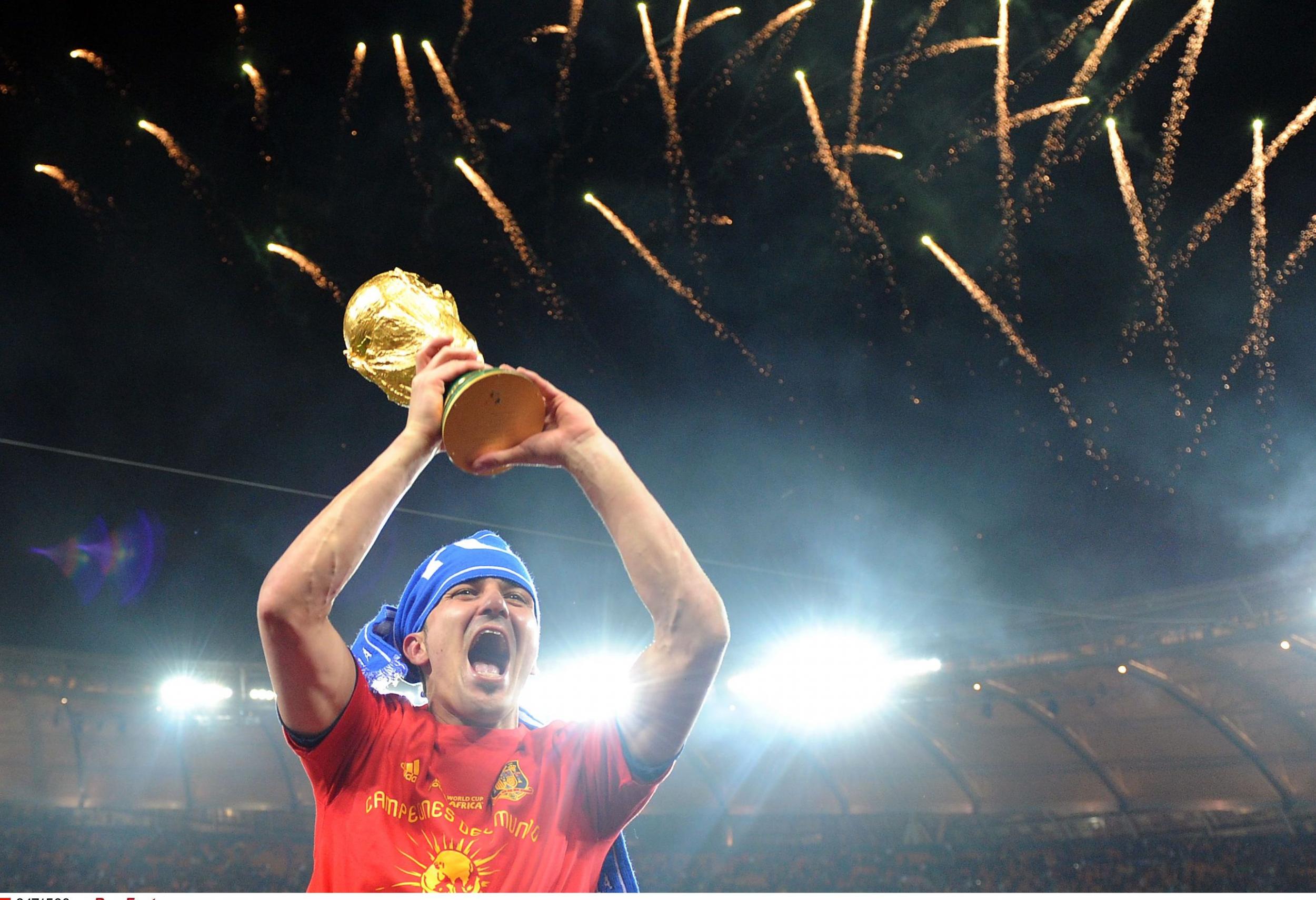My favourite sports documentary – Fifa’s Match 64: The Inside Story of the 2010 Final
Our series of personally chosen films continues with chief sport writer Miguel Delaney’s selection of a film with a very personal association: Fifa’s film of the first World Cup final he ever attended, back in 2010 in South Africa. He’s not claiming to have been a neutral…


If there is no feeling on a football pitch like scoring the winning goal in a World Cup final, there are few off it like the atmosphere of anticipation before such a game.
There’s just a crackle to the air, an exhilarating awareness that something that will go down in history is happening.
It was a feeling best articulated by Hugh McIlvanney, in his piece on that most cherished of finals, the 1970 showpiece in the Azteca.
“There is a beautiful self-contained quality about a World Cup final,” McIlvanney writes. “All the other matches, whatever their own vivid excitements, can only nourish the expectations of that last collision. Earlier days offer sudden death but this is the only one that offers instant immortality… To those of us whose childhood and adolescence left us permanently impregnated with the mythology of football, it is inevitably a moving occasion. Sprinting through the rain to the bare, hard-seated buses that were to take us from the Maria Isabel to the Azteca Stadium on the morning of Sunday, June 21, we had that heightened sense of anticipation that invests every trivial preliminary with a tremor of pleasure. Every joke seemed funnier, every face friendlier. You could say that our behaviour was childish or you could say we were reacting normally to the prospect of one of the last great communal rituals available to our society. You can say what you like. We were just glad to be going to the World Cup final.”
If you’ll forgive the switch into the first person, I’d purposely read these words again on the eve of my first World Cup final, in South Africa in 2010. I fully felt every sentiment.
I was certainly be glad to be going to the World Cup final, as I sat on the same sort of shuttle bus, its long and slow journey through the congested traffic of Johannesburg only accentuating and perfectly fitting that sense of anticipation.
These were emotions that all came drifting back as I watched Fifa’s documentary on that match, Game 64.
It is one of the many films the usually controversial global body has released on its YouTube channel during the Coronavirus crisis, and it’s surprisingly good – and moving.
It does start a little slowly, as it methodically goes through the people involved in setting up the final – the groundsman, the flag-bearer. You gradually realise that is tonally intentional in order to create that same sense of build-up, the same escalation of excitement.
My own memories were much the same.
The sense that you’re attending what is probably the planet’s biggest global event, something that more eyes are on than anything else, properly sinks in over the day – especially given the “who’s who” of attendees. I remember going for breakfast around the main mall in Sandton, and looking up to see Argentina star Javier Zanetti playing with his children. A few minutes later, I was almost certain I walked by Rafa Nadal. As the documentary shows, he was certainly there to support his country, Spain, against the Netherlands.
That’s also why this was a highly personal event for me, beyond the fact it was my own first final. As you can tell from the name, I’m half-Spanish. My mother is Spanish and my father from Dublin and although I was born in Dublin and grew up there, I've always felt as Spanish as I do Irish. There did feel a personal sense of providence that my own first World Cup final coincided with one of my countries' first. It was all the more pronounced given that there was a sense of destiny about that for Spain, with the way the team had evolved to become the best in the world, while also defining a new era of play that continues to condition the game. A side featuring Xavi, Andres Iniesta, David Villa, Gerard Pique, Carlos Puyol and Sergio Ramos remains one of the greatest of all time.

Victory certainly didn’t feel inevitable at that time. I just felt nervous, as the images from Game 64 – a mix of behind-the-scenes footage and outside around the stadium – reminded me.
While I was there to work as an accredited journalist for Irish newspaper The Sunday Tribune, which sadly went bust just a few months later in 2011, it was very difficult to detach that from my personal emotional investment. Since it was a Sunday game in the days just before the internet became all-consuming, though, I wasn’t actually writing live. I was there to observe, and feel it all.
Any guilt I felt about potentially allowing personal emotion to influence professional rationale quickly evaporated by the time the media shuttle bus reached its third stop, mind. There, an accredited journalist – with his lanyard around his neck – got on decked head to toe in Spanish colours, complete with full face paint. He wasn’t alone in the cavernous Soccer City media area, and there were a few with the Dutch colours too.
Game 64 shows some of them, and even a photographer with an Irish jersey and dyed green hair. This is what an event like this brings out.
One simple scene that stands out in the documentary is the image of the blue searchlights emanating from the roof of Soccer City as it became dusk, with the sound of helicopters overhead. Many of the people interviewed – from referee Howard Webb to players like Jon Heitinga – mention the same scene as they were driven to the stadium. It just fostered that feeling you were going to something so huge.
“Then you arrive at the stadium and see the lights,” Heitinga remembers. “The feeling is indescribable.”
I recall the exact same sentiment as we drove up, seeing it on the horizon.
I got to the stadium at least five hours early “to be safe”, although the journey took about two hours due to the traffic. Soccer City’s surroundings are still so massive that, in walking to the press box, myself and Irish colleague Ken Early still had to sprint up when we were on the concourse as we heard the closing ceremony start. “Is that Shakira?!” Another gloriously infantile moment on football’s most intensely grandiose day.
The documentary shows that, and listening to the distinctive sounds of that ceremony transported me there. It then cuts to one of the true highlights of the day, and the tournament. Nelson Mandela came out. As much as it was a privilege to attend the World Cup final, the size of the event offered the greater privilege of sharing a stadium – or at least the same 500m space – with an individual of true historic importance.
As this was happening, the cameras go back inside the walls of the stadium, to the players. Sergio Ramos shouts, “It’s now or never!”
The football scenes, as is actually the case with a lot of these Fifa films, are beautifully shot. The actual football itself isn’t beautiful. The game started notoriously aggressively, best represented by Nigel De Jong’s high kick to the chest of Xabi Alonso. He somehow escaped a red card.
There is genuine football insight, as Dutch staff member and former player Frank De Boer reveals the half-time team talk.
“We really criticised the players. ‘Go and play your own game. Take the initiative. Dare. That is why you were selected, because you have these qualities. Shake the stress out of your body. If you continue playing like that you will get red cards and lose the match for sure.’”
When the final is recalled now, it is generally remembered as a tedious game. Webb even mentions this.
I don’t remember it being tedious. It was far too tense. I was gripped. The documentary brings all this back, and reminds just how many chances there actually were in the match. The best of the game fell to Arjen Robben on about 68 minutes, when he was put clean through on Iker Casillas’s goal.
As the move is shown, and even though I intimately know what happens next, I can’t help myself instinctively moving my body to the right – as if to will Casillas to make the same action. He does it.
The day is saved. The game is there to be won, as David Villa says. “We got the sense it was going to be our day.”
The moment eventually comes, the latest winning goal in World Cup history, in the 116th minute. Andres Iniesta finishes. It an intensely emotional moment, and an intensely personal moment, as he lifts his shirt to reveal a message to a tragically departed former teammate, who died of sudden adult death syndrome the year before: “Dani Jarque, always with us.”
It is moving, as the documentary puts you right into the celebrations – and the commiserations.
There’s evidently not a feeling like it. There’s not a day like it.
Match 64 does a good job of evoking that.
Join our commenting forum
Join thought-provoking conversations, follow other Independent readers and see their replies
Comments